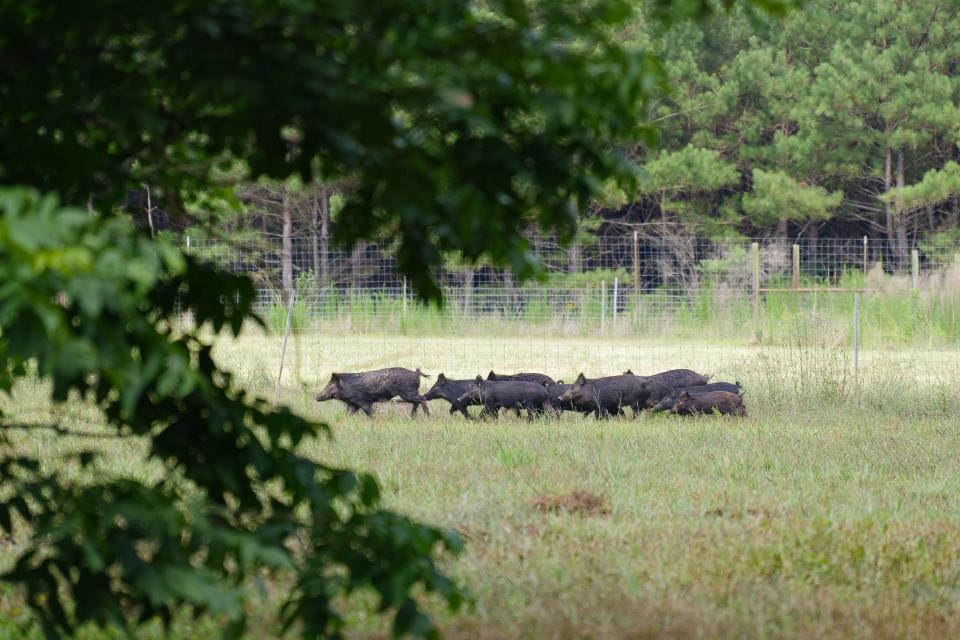LSU lands patent for poison pig gummies to dent Louisiana's exploding wild hog population
LSU AgCenter scientists have secured a patent for poison gummies that could finally reduce an exploding feral hog population causing as much as $100 million in annual agriculture losses and threatening the integrity of Louisiana's levee system.
The wild hogs have been called a "horrific plague" by former Louisiana Wildlife and Fisheries Secretary Robert Barham, but liberal hunting laws, state-funded traps and a proposed $5 bounty on hog tails haven't even dented their numbers.
Louisiana feral hog population has grown from 600,000 to 1 million in eight years, about the same as the combined human population for the state's largest four cities - New Orleans, Baton Rouge, Shreveport and Metairie.
But on Aug. 8 the LSU AgCenter secured a patent on a poison bait the scientists say has minimal impact on the environment and nontarget species. With a consistency similar to gummy bears, it is shaped into golf ball-sized spheres, tastes fishy and even glows under black light.
The patent was issued to LSU with the inventors listed as Glen Gentry, an animal scientist and director of the LSU AgCenter Bob R. Jones-Idlewild Research Station in Clinton, John Pojman, an LSU chemistry professor, and Baylen Thompson, a former graduate student who worked under Pojman.
“This is a milestone for us,” Gentry said in an LSU AgCenter press release.
Louisiana Agriculture Commissioner Mike Strain agreed.
"It's a huge step," Strain said in an interview with USA Today Network.
Louisiana has the third largest feral hog population in the U.S. Only Texas and Oklahoma have more (up to 1.5 million in each state).
“Feral swine continue to be a growing problem to farmers, ranchers, foresters and landowners in many areas of the U.S. and are considered to be one of the most damaging invasive species in existence,” wrote LSU AgCenter study authors Michael Salassi, associate vice president and program leader for plant and animal sciences, Melissa Cater, director of the northeast region, and Gentry.
They root up, wallow in and trample crops, tree seedlings and wildlife food plots. They also are known to wreak havoc on pastures, drains, levees, fences and waterways.
And they can be dangerous.
"They can definitely be aggressive," Strain said.
Feral hogs multiply quickly, with sows able to have two litters of five to six piglets each year and few natural predators.
Experts at the LSU AgCenter estimate 70% of the feral hog population would have to be killed each year just to stay even.
"We're losing ground," Strain has said.

But the new bait invented by the LSU scientists could reverse the trend if the AgCenter can get a licensed permit from the Environmental Protection Agency.
The sodium nitrite bait offers a more effective control method with the bonus of being humane, Gentry said. Within three hours of consuming the bait, hogs become sleepy and die.
Sodium nitrite is an ideal toxicant, he said, because it is deadly to swine and eventually breaks down into compounds that do not harm other species or pose environmental concerns.
The scientists are now focusing on conducting additional field trials and studies on shelf life. They also are looking for the best ways to deliver the bait, with possible solutions including burying the bait so hogs can root it up or releasing it from a feeder using a cellphone.
“All of this is required before it can be approved by the EPA and released to the public,” Gentry said.
Editor's note: The LSU AgCenter contributed to this report.
Greg Hilburn covers state politics for the USA TODAY Network of Louisiana. Follow him on Twitter @GregHilburn1.
More: Louisiana is overrun with menacing wild hogs, but bounty for pig tails isn't answer
This article originally appeared on Monroe News-Star: LSU poison pig gummies may be answer to feral hog population explosion

